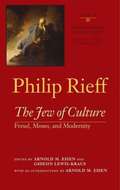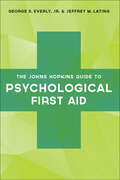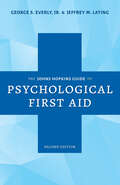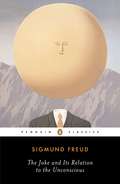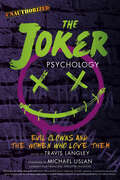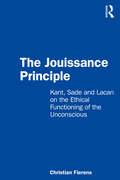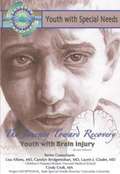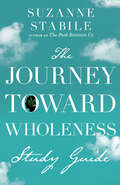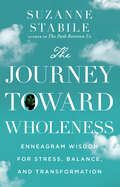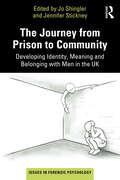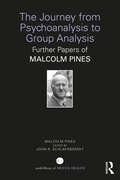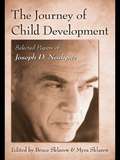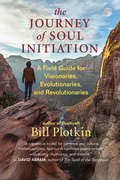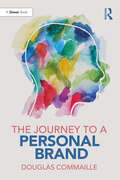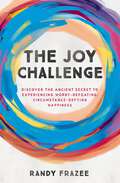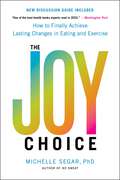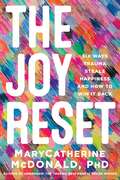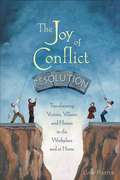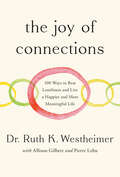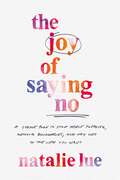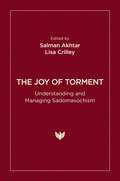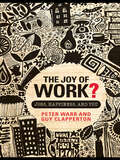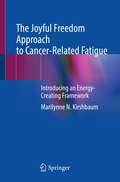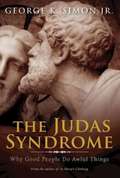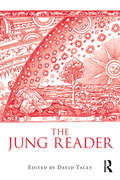- Table View
- List View
The Jew of Culture: Freud, Moses, And Modernity
by Philip RieffRieff’s long career, "Jew of culture" would serve as foil, counter type, corrective, and adversary to the "therapeutics" who represented both Rieff’s analysands and his antagonists. The purpose of this collection of Rieff’s writings, undertaken at his suggestion, is to trace the evolution of the "Jew of culture" over the course of his work. In doing so we gain particular insight into his distinctive theory of society and the self; we also come to better understand the theorist.
The Johns Hopkins Guide to Psychological First Aid
by George S. Everly Jr. Jeffrey M. LatingLearn the essential skills of psychological first aid from the expert who created the Johns Hopkins RAPID PFA method.Psychological first aid, or PFA, is designed to mitigate the effects of acute stress and trauma and assist those in crisis to cope effectively with adversity. PFA is designed to be applied in emergencies, including disasters and terrorist attacks. In this essential guide, George S. Everly, Jr., developer of the Johns Hopkins RAPID PFA method, and Jeffrey M. Lating, his collaborator in its implementation, describe the principles and practices underpinning this psychological model in an easy-to-follow, prescriptive, and practical manner. They explain the history of PFA and persuasively demonstrate its powerful versatility. Mental health practitioners can apply PFA in all settings. It can also be used as a public-health tool to address mental health needs following critical incidents and as a means for building community resilience.Aimed at mental health practitioners, all first responders, and global health disaster teams such as Médecins Sans Frontières and the World Health Organization, The Johns Hopkins Guide to Psychological First Aid is the first book to thoroughly explain RAPID PFA. RAPID, a unique theoretically grounded and evidence-based PFA method, follows a set of easily understood principles. In each chapter, Everly and Lating provide a step-by-step approach and include a key point summary to emphasize essential elements. A unifying case exemplifies each phase of the RAPID PFA model in an ongoing dialogue that presents ideal PFA responses, examples of common mistakes, and various outcomes.In addition to their counseling experience in Kuwait after the Gulf War and in New York City after the September 11 attacks, the authors have traveled nationally and internationally to teach the RAPID PFA method in numerous public health, fire, police, military, and faith-based settings. Beneficial to those with little or no previous mental health training, this book is an essential tool for people who want to learn, to practice, or to retain their ability to use psychological first aid effectively.
The Johns Hopkins Guide to Psychological First Aid
by George S. Everly Jr. Jeffrey M. LatingLearn the essential skills of psychological first aid from the experts—the creators of the Johns Hopkins RAPID PFA method.Psychological first aid, or PFA, is designed to mitigate the effects of acute stress and trauma and assist those in crisis to cope effectively. PFA can be applied in emergencies, including disasters, terrorist attacks, and the COVID-19 pandemic. In the second edition of this essential guide, George S. Everly, Jr., and Jeffrey M. Lating draw on their experiences in Kuwait after the Gulf War, in New York City after the September 11 attacks, and during the COVID-19 pandemic to describe the principles and practices of PFA in an easy-to-follow, prescriptive, and practical manner. Informed by current events, the second edition includes updated chapters as well as three completely new chapters on • cultural awareness• PFA considerations with children• the use of PFA to facilitate community mental health and resilienceAimed at mental health practitioners, first responders, and global health disaster teams such as Médecins Sans Frontières and the World Health Organization, but also beneficial to those with little or no previous mental health training, The Johns Hopkins Guide to Psychological First Aid thoroughly explains RAPID PFA. RAPID, a unique evidence-informed and evidence-based PFA method, follows a set of easily understood principles. In each chapter, Everly and Lating—who have traveled nationally and internationally to teach the RAPID PFA model in numerous public health, fire, police, military, business, and faith-based settings—provide a step-by-step approach and include a key point summary. A unifying case exemplifies each phase of the RAPID PFA model in an ongoing dialogue that presents ideal PFA responses, examples of common mistakes, and various outcomes.
The Joke and Its Relation to the Unconscious
by Sigmund FreudWhy do we laugh? The answer, argued Freud in this groundbreaking study of humor, is that jokes, like dreams, satisfy our unconscious desires. The Joke and Its Relation to the Unconscious explains how jokes provide immense pleasure by releasing us from our inhibitions and allowing us to express sexual, aggressive, playful, or cynical instincts that would otherwise remain hidden. In elaborating this theory, Freud brings together a rich collection of puns, witticisms, one-liners, and anecdotes, which, as Freud shows, are a method of giving ourselves away. .
The Joker Psychology: Evil Clowns and the Women Who Love Them (Popular Culture Psychology #12)
by Travis LangleyA fun, frightening, and fascinating deep dive into the psyche of a madman: Batman&’s nemesis, the Clown Prince of Crime. Since he first fought Batman in 1940, The Joker has evolved into one of popular culture's most complex and confounding psychological creations: both a criminal mastermind and an unhinged psychopath. In The Joker Psychology: Evil Clowns and the Women Who Love Them, Dr. Travis Langley, author of the bestselling Batman and Psychology, returns to Gotham City to explore the twisted psyche of this great supervillain, as well as the personalities who are inexorably drawn to it. Paying special attention to the strange dynamics of relationships like the one between The Joker and Harley Quinn, this collection includes some very special interviews with people who brought The Joker and Harley Quinn to life in comics and onscreen, and analyzes: · Why a bright, laughing monster who looks like a clown could be the ultimate antagonist to a grim, brooding hero who looks like a monster · The relationship between a therapist and her patient—and what happens when a therapist crosses the line, as Harley Quinn does when she falls for The Joker · How a smart person could fall for the most dangerous of criminals · Why so many fans find Harley Quinn inspirational · How different kinds of therapy could (or could not) help twisted minds like Mister J and Harley Quinn The development of a fictional character that so completely embodies psychopathy (including interviews with creators who have shaped The Joker&’s character over the years), and more
The Jouissance Principle: Kant, Sade and Lacan on the Ethical Functioning of the Unconscious
by Christian FierensThis book examines the concept of jouissance, a Lacanian term that refers to enjoyment experienced in different ways, from the enjoyment taken in an action that is ethically disapproved to the hidden pleasure taken by the patient in and from his symptom. Christian Fierens offers a new and rigorous explanation of jouissance as a third principle in the functioning of the unconscious, in addition to the technical and pleasure principles. The Jouissance Principle presents a detailed cross-reading of two key works: Kant’s Critique of Pure Reason and Lacan’s paper ‘Kant with Sade’, explaining how the functioning of the unconscious is a genuinely ethical process. The book also focuses on the role of psychoanalysis in relaunching the functioning of the unconscious, outlining the fourth form of Lacan’s object a and its stakes in the psychoanalytic process. An intriguing discussion of the relationship between pleasure, ethics and rationality, The Jouissance Principle will interest scholars of psychoanalysis and European philosophy, as well as helping clinicians to find a practical and ethical pathway through their practice.
The Journey Toward Recovery: Youth with Brain Injury (Youth with Special Needs)
by Joan EsherickJerome pedaled down the mountain, his friends Tommy and Eric racing to catch up. The wide, flat path was made for smooth riding, but Jerome's mind wasn't on the trail. A sudden rustling in the brush ahead startled him out of his daydreaming. A dog darted out of the shrubs, then stopped dead in the trail. The next several seconds seemed to pass in slow motion. Jerome squeezed hard on the hand brakes, but it was too late. His front wheel collided with the animal; the dog yelped; and Jerome somersaulted over his handlebars. Tommy said later he would never forget how his friend flew through the air and collided head-on with the sycamore tree. Eric said he'd never forget the sickening thud the impact made. But what his friends would never forget, Jerome would never remember. In a brilliant white flash, Jerome's life as he knew it was gone. What do bikes, cars, scooters, sports, tumors, strokes, guns, and the shaking of babies all have in common? They all can cause brain injuries. Every twenty-one seconds, one person in the United States sustains a traumatic brain injury. In The Journey Toward Recovery: Youth with Brain Injury you will read about Jerome, one teen who finds his life changed forever in a split-second accident. Along the way, you will also learn about other forms of brain injury; how these injuries affect people's lives; and how schools, doctors, and lawmakers are helping youth with this form of special need.
The Journey Toward Wholeness Study Guide
by Suzanne StabileAn overview of the session themeDiscussion questionsAn opportunity to journey deeper into the session's themeIdeas for applying what we are learning between sessions
The Journey Toward Wholeness: Enneagram Wisdom for Stress, Balance, and Transformation
by Suzanne StabileIn everything from health care and politics to technology and economics, we are experiencing feelings of loss, anger, and anxiety. In the Enneagram's wisdom, our number determines how we respond. We automatically move to another number when we're feeling stress and to yet another when we're feeling secure. Such moves may help us feel better temporarily but don't last. For those who want to dive deeper into Enneagram wisdom, expert teacher Suzanne Stabile opens the concept of three Centers of Intelligence: thinking, feeling, and doing. When we learn to manage these centers, each for its intended purpose, we open a path to reducing fear, improving relationships, growing spiritually, and finding wholeness. Drawing on the dynamic stability of the Enneagram, she explains each number's preferred and repressed Center of Intelligence and its role in helping us move toward internal balance. Using brief focused chapters, this book provides what we need to deal with the constant change and complexity of our world to achieve lasting transformation in our lives.
The Journey from Prison to Community: Developing Identity, Meaning and Belonging with Men in the UK
by Jo Shingler Jennifer StickneyThe Journey from Prison to Community: Developing Identity, Meaning and Belonging with Men in the UK provides a practical guide for practitioners working with men to successfully make the transition between prison and the community. This transition presents significant challenges, especially for those who have served many years in prison; for those who have experienced multiple cycles of release/recall; for those whose personality traits make it harder for them to build relationships and cope with strong emotions; and for those whose lives have been characterised by trauma, chaos, crime and institutionalisation. Drawing on the authors' clinical expertise and the lived experiences of real service-users, alongside the latest research in the field, the book identifies key issues in transition and explores the impact of these issues. Crucially, it provides guidance, tools and support to professionals working with men in the UK to build a crime-free, socially integrated and meaningful life after incarceration, featuring real-life stories of those who have made the transition. This is an essential read for professionals working in a range of settings across prison and community environments, while the wide variety of professional experience represented in the book broadens its appeal to forensic and clinical psychologists, occupational therapists, probation officers, prison staff and those working in the third sector. It is also valuable resource for qualified professionals, those in training, support roles, and managers involved in planning strategy and service delivery.
The Journey from Psychoanalysis to Group Analysis: Further Papers of Malcolm Pines (World Library of Mental Health)
by Malcolm PinesThe Journey from Psychoanalysis to Group Analysis presents a selection of papers from Malcolm Pines’s long career, documenting his profound contribution to group analysis and its applications.John Schlapobersky, editor, is a well-established author who organised the collection in: History; Development of Method; Metapsychology/Neurology; Final Papers. The compilation distils the life’s work of a pioneer in many fields - psychiatrist, psychoanalyst, group analyst, editor and author. Pines’s writing encompasses psychoanalytic and group analytic theory, developmental psychology, neuroscience, ethology, social science, language theory and mythology. He seeks their integration in the crucible of group analysis.The book will become an essential text in psychotherapy and therapeutic communities - of value to students and readers in psychoanalysis and psychotherapy, politics, social and neurological sciences, humanities and language theory.
The Journey of Child Development: Selected Papers of Joseph D. Noshpitz
by Bruce Sklarew Myra SklarewAs founder and past president of the American Academy of Child and Adolescent Psychiatry and president of the American Association of Children's Residential Centers, Joseph Noshpitz was at the forefront of psychodynamic treatment and research with children and adolescents for more than forty years. He was the editor-in-chief of the six volume Handbook of Child Psychiatry, co-author of the two volume Pathways of Growth: Essentials of Child Psychiatry, and co-editor of Stressors and the Adjustment Disorders. His breadth of knowledge and wisdom ranged well beyond the traditional areas of diagnosis and therapeutic interventions, envisioning the child as an individual within the family and the wider culture. Based on psychoanalytic ideas and without jargon, Noshpitz's innovative ideas are grounded in the developmental theories of Freud, Mahler, and Kernberg. These previously unpublished papers demonstrate Noshpitz's scope and the depth to which he conceived the psychic life of the child. Each paper is introduced by experts who contemporize and contextualize the work for the modern reader. The wide-ranging papers include ethics in child development, narcissism in the grade school years, tomboyism, idealization, negative ego ideals, and self-destructiveness in adolescence. More applied papers delve into the formative appeal of literature for adolescent girls, the developmental lessons of the Ninja Turtles, and the creative early motivations behind art, music, dance, mime, and poetry. The papers present an unyielding advocacy for the progressive development of the child interacting with the society at large, most evidenced in the extraordinarily far-reaching proposal for wider preventive family interventions. As poignant now as the time when they were written, Noshpitz's thoughtful commentaries and analyses repeatedly demonstrate his intrinsic curiosity, joy of learning, generosity and sensitivity to the myriad struggles of youth. His psychodynamic sensibility is a contrast to this era of quick psychopharmalogical fixes, cognitive-behavioral approaches, and managed care. To learn more about the life and work of Joseph Noshpitz, and to access more of his unpublished work, please visit http://josephnoshpitz.com.
The Journey of Soul Initiation: A Field Guide for Visionaries, Evolutionaries, and Revolutionaries
by Bill PlotkinSoul initiation is an essential spiritual adventure that most of the world has forgotten — or not yet discovered. Here, visionary ecopsychologist Bill Plotkin maps this journey, one that has not been previously illuminated in the contemporary Western world and yet is vital for the future of our species and our planet. Based on the experiences of thousands of people, this book provides phase-by-phase guidance for the descent to soul — the dissolution of current identity; the encounter with the mythopoetic mysteries of soul; and the metamorphosis of the ego into a cocreator of life-enhancing culture. Plotkin illustrates each phase of this riveting and sometimes hazardous odyssey with fascinating stories from many people, including those he has guided. Throughout he weaves an in-depth exploration of Carl Jung&’s Red Book — and an innovative framework for understanding it.
The Journey to a Personal Brand
by Douglas CommailleTransitions in life are now a reality for everyone. This book takes you through the journey to create your own Personal Brand and take ownership of and address these transitions based on your values, career, skills, knowledge and aims. A Personal Brand is a positive in the reader’s life – professionally, personally and psychologically. It builds people’s confidence and is founded on who they are, their achievements and successes, as well as their technical and person-to-person skills. Drawing upon well-known Personal Brands, including Walt Disney, Nelson Mandela and Steve Jobs, The Journey to a Personal Brand forces readers to reevaluate themselves critically and honestly. Readers are guided through creating a distinctive brand from scratch through to launching it on digital media. This intensely practical guide is essential reading for the professional, the return-to-worker, the student and early retiree alike or those wishing to improve their life and bring added value to their careers, personal profile or reputation.
The Joy Challenge: Discover the Ancient Secret to Experiencing Worry-Defeating, Circumstance-Defying Happiness
by Randy FrazeeWhat if you could close the "joy gap," that distance between how you feel now and the way you wish you felt? In The Joy Challenge, pastor and bestselling author Randy Frazee shares the secret to experiencing real, lasting joy--and stepping into a life of contentment and purpose.If this sounds familiar, Frazee has good news for you. In The Joy Challenge, he shares the secret to experiencing genuine joyfulness, the kind of resilient happiness that doesn't evaporate in the face of challenges and setbacks. Bringing together research about the science of happiness with the apostle Paul's masterclass on joy in the book of Philippians, The Joy Challenge will help youdiscover the vital link between increasing your joy and winning the battle against worry and anxiety;develop patterns and mindsets of gratefulness and forgiveness that clear obstacles to happiness; andaccess the kind of circumstance-defying contentment that opens the door to a truly fulfilled life--even when there&’s a gap between the life you have now and the life you hope for. As you encounter these easy-to-understand principles, thought patterns, and habits, you'll begin to experience more joy and happiness, transforming your relationships and your outlook for the better. It's time to discover the freedom of a deeply joyful life.
The Joy Choice: How to Finally Achieve Lasting Changes in Eating and Exercise
by Michelle SegarLearn to live a happier and healthier life with the help of this book—start changing behaviors and create new habits using fun and easy science-based solutions. What if you could easily and joyfully resolve the in-the-moment conflicts that often derail your eating and exercise goals? Much of what we&’ve been taught about creating change in eating and exercise is simplistic, outdated, and for many, misguided. Sustainable-behavior-change researcher and lifestyle coach Michelle Segar has devoted decades to the study of how to achieve lasting changes in eating and exercise and other self-care behaviors. Segar explains the surprising reasons why our eating and exercise plans so often crash when they come up against real life. She calls these conflicts &“choice points,&” and shows that they are the real place of power for achieving lasting changes in eating and exercise.The Joy Choice offers a fresh, brain-based solution that turns the old behavior-change paradigm on its head. This groundbreaking book liberates you from the self-defeating obligations and rigid requirements of past diet and workout regimens and reveals what emerging research suggests really drives the consistent choices that power sustainable change. Designed from cutting-edge decision science and real-world experience coaching clients, you&’ll discover the easy, flexible, and three-step joy-infused decision tool that works with the chaos of daily life, guiding you to finally achieve and maintain your eating and exercise goals once and for all—and enjoy doing it! "One of the best health books of 2022&”—Washington Post &“If you want a smart, science-based, and joyful approach to sustainable behavior change, start here." ―Tom Rath, NYT bestselling author of Eat Move Sleep and StrengthsFinder 2.0 "The Joy Choice...reveals easy and fun ways to stay consistent with our health goals, while still tending to the meaningful people and demands in our lives."―Tina Payne Bryson, Ph.D., NYT bestselling co-author of The Whole-Brain Child and author of The Bottom Line for Baby "If you&’re frustrated with your progress in exercising and eating right, this book is for you. Michelle Segar shifts the focus...toward a new approach to our choices that is full of humanity, imperfection, and, yes, joy.&” ―Daniel H. Pink, NYT bestselling author of The Power of Regret and Drive
The Joy Reset: Six Ways Trauma Steals Happiness and How to Win it Back
by Dr. MaryCatherine McDonaldFrom the "Brené Brown of trauma" comes a groundbreaking, actionable guide to healing trauma through a reframing and adaptation of Positive Psychology. Joy can feel complicated, especially to someone who is struggling. Against the very real darkness that life offers up, a chorus of &“but do you have a gratitude journal?&” or &“have you tried yoga?&” can feel isolating and dismissive. And yet, the research on resilience, joy, gratitude, hope, and post-traumatic growth proves unequivocally that these emotions are healing. When it comes to deploying that research and adapting it into actionable tools for people with a history of trauma, psychology falls desperately short. To bridge this gap, Dr. MaryCatherine McDonald has reframed these concepts and created new interventions for anyone who struggles to feel at home with joy. In The Joy Reset, Dr. McDonald helps readers identify barriers that prevent them from accessing joy—hypervigilance, emotional numbing, fear of loss, conditioning, guilt, and shame—and then redefines positive emotions as those tenacious, gritty, often tiny experiences that appear within the darkest moments and form the very foundation of psychological resilience. Rooted in the neurobiology that explains how and why trauma and suffering can impede our path to hope and joy, Dr. McDonald shares exercises that make joy and gratitude both bite-sized and accessible, inviting readers to welcome these emotions back in. By emphasizing the very real ways that joy and hope show up even in our toughest moments, The Joy Reset empowers readers to find the light in the dark—no matter what.
The Joy of Conflict Resolution
by Gary HarperThe rapid rate of change in the workplace and among families often leads to conflict and confrontation which can undermine productivity and poison relationships. The Joy of Conflict Resolution helps readers understand conflict and why it arises through the lens of the "drama triangle" of victims, villains and heroes. In an accessible, engaging and lighthearted style that uses stories and humor to explore potentially emotionally charged situations, it provides proven and practical skills to move beyond confrontation to resolve conflicts collaboratively. In over 13 years as a trainer, facilitator and mediator, Gary Harper has taught thousands of people in both the public and private sectors to successfully manage conflict. He also teaches for the Centre for Conflict Resolution at the Justice Institute in Vancouver, BC.
The Joy of Connections: 100 Ways to Beat Loneliness and Live a Happier and More Meaningful Life
by Dr. Ruth K. WestheimerNATIONAL BESTSELLER • In Dr. Ruth&’s final book, the iconic therapist offers an urgent guide to combating loneliness with 100 ways to increase connectivity right now, based on insights from her life story and her unparalleled career.&“Dr. Ruth&’s strategies are essential for building the kinds of bonds that will reduce loneliness and transform lives.&”—Gretchen Rubin, #1 New York Times bestselling author of The Happiness ProjectWhen Surgeon General Vivek Murthy sounded the alarm that loneliness &“represents an urgent public health concern&”—exacerbated by social media overuse, the residual effects of the pandemic, and the lack of meaningful relationships—trusted therapist Dr. Ruth K. Westheimer knew that her unique perspective and expertise could help. Long beloved for breaking stigmas around sexual problems, Dr. Ruth made it her mission to help individuals break free from the bonds of hopelessness and isolation.We are social animals. We have a shared desire to connect and create lasting relationships with the people around us. But the heaviness of loneliness can make this feel impossible. Dr. Ruth, with Emmy Award–winning journalist Allison Gilbert and longtime collaborator Pierre Lehu, tackles the subject with compassion and her trademark no-nonsense approach. She provides practical and creative strategies for finding friends, community, and intimacy. And it&’s anchored by Dr. Ruth&’s own story, from the horrific loneliness of losing her family in the Holocaust to living in an orphanage to rebuilding her life in America and eventually becoming a world-renowned sex therapist.With 100 concrete and innovative opportunities that can be put to use immediately, The Joy of Connections isn&’t only an action-oriented guidebook on overcoming loneliness from one of the most well-respected therapists of our time; it&’s also the vital kick in the pants we all need in order to start seeking—and finding—deep and lasting human connections.
The Joy of Saying No: A Simple Plan to Stop People Pleasing, Reclaim Boundaries, and Say Yes to the Life You Want
by Natalie LueAre you still playing a role you learned in childhood to please others, such as the Good Girl/Boy, the Overachiever, or the Helper? Though these kinds of roles may have gained us attention and affection, they prohibited us from becoming our true selves.People-pleasing--putting others ahead of ourselves to avoid something negative or to get something we want or need--runs rampant in our society. Saying yes when we should say no leaves us stuck in frustrating patterns. And when we don&’t say yes authentically, we say it resentfully, which leads to more problems than if we'd said no in the first place.The Joy of Saying No will help you identify your people-pleasing style and habits. A six-step framework then teaches you how to discover the healing and transformative power of no toestablish healthier boundaries,foster more intimate relationships and fulfilling experiences, andreconnect with your values and authentic self.
The Joy of Torment: Understanding and Managing Sadomasochism
by Salman Akhtar and Lisa CrilleyA search for answers on the subject of sadomasochism: its origins, forms and functions, nature, and societal status. An international group of distinguished psychiatrists, psychologists, and psychoanalysts investigate the riddle of sadomasochism from heuristic, ontogenetic, nosological, psychodynamic, sociocultural, and therapeutic perspectives. With contributions from Prachi Akhavi, Salman Akhtar, Ruth Axelrod-Praes, Lisa Crilley, Victoria Curea, Tom DeRose, Nilofer Kaul, Otto Kernberg, Arsalan Malik, Jack Novick, Kerry Kelly Novick, Philip A. Ringstrom, Louis Rothschild, Asmita Sharma, and Benny Weiss-Steider.
The Joy of Work?: Jobs, Happiness, and You
by Guy Clapperton Peter WarrAre you happy at work? Or do you just grin and bear it? We spend an average of 25% of our lives at work, so it’s important to make the best of it. The Joy of Work? looks at happiness and unhappiness from a fresh perspective. It draws on up-to-date research from around the world to present the causes and consequences of low job satisfaction and gives helpful suggestions and strategies for how to get more enjoyment from work. The book includes many interesting case studies about individual work situations, and features simple self-completion questionnaires and procedures to help increase your happiness. Practical suggestions cover how to improve a job without moving out of it, advice about changing jobs, as well as how to alter typical styles of thinking which affect your attitudes. This book is unique. The subject is of major significance to virtually all adults - people in jobs and those who are hoping to get one. It is particularly distinctive in combining two areas that are usually looked at separately – self-help approaches to making yourself happy and issues within organizations that affect well-being. The Joy of Work? has been written in a relaxed and readable style by an exceptional combination of authors: a highly-acclaimed professor of psychology and a widely published business journalist. Bringing together research from business and psychology – including positive psychology – this practical book will make a big difference to your happiness at work – and therefore to your whole life.
The Joyful Freedom Approach to Cancer-Related Fatigue: Introducing an Energy-Creating Framework
by Marilynne N. KirshbaumThe book introduces The Joyful Freedom Approach, as a strategy for recovery from fatigue. It was initially developed through a series of research studies inspired initially by women who had breast cancer and were troubled by ongoing cancer-related fatigue. The integrated, holistic approach has scope for supporting individuals who have experienced energy depletion not just due to cancer and its treatments, but also in relation to other illnesses, conditions or distressing life events. The approach is aimed at helping people to discover what they can do to energise their lives following an event such as cancer that has left them lacking vitality, wellness or a sense of direction and clarity about how to live life fully. Research has culminated in identifying five attributes of energy restorative activities; these are represented by the Energy Restoration Framework. The attributes of Purposeful Expanding, Connecting/Belonging, Awe-inspiring and Nourishing act as headings for discussion, planning and integration into an individual’s recovery and beyond. The book is organised into three parts and subdivided into chapters. Part One contains the chapters of: The Inspiration, The Challenge and the Resolution. These first chapters offer the reader a gateway to the Joyful Freedom Approach starting with a narrative that starts from nursing practice and discovering energy-fields, through to the foundations and detail surrounding evidence-based research on cancer-related fatigue and possible interventions. Part Two consists of chapters that serve to place the energy-creating framework in context: Philosophy and Theory; Evidence for Change and Research in Practice. Here, the influential Attention Restorative Theory of Professor Stephen Kaplan, an environmental psychologist, is introduced. The discussion then progresses onto the adaptation of Kaplan’s theory to the cancer care and illness context. Part Three provides an overview and representation of The Energy Restoration Framework leading to the emergence of the Joyful Freedom Approach. The book concludes with a discussion of how theory and practice can be brought together and applied using The Joyful Freedom Approach. The book is aimed at health care practitioners who are engaged with counselling people through distressing life events. This would include nurses, medical doctors, social workers or occupational therapists who work with individuals who are recovering from illnesses or surgery, or mental health practitioners who help their clients to regain control and navigate through distressing life events. The book offers practitioners and therapists an evidenced-based template that is versatile and adaptable to meet the needs of a varied range of clients.
The Judas Syndrome: Why Good People Do Awful Things
by Dr George K. Simon Jr.Even people we think are our friends will deny and betray us. Are they bad people, or just don't do enough, or people with good intentions but acting in ignorance? Or are they basically decent people who, when put to the test, fail because of their weak faith? Filled with many examples, Judas Syndrome gives concrete ways to prevent people, even other Christians, from hurting you and the role that faith can play in changing them and helping you avoid the pain that these relationships often bring. Although sometimes we suffer as a result of our own shortcomings and missteps, placing our trust in Christ's message of love provides the gateway to the life God intends for us. In other words, faith can really save us--a faith, however, that is not easily undertaken on a daily basis or one that can be sustained alone.
The Jung Reader
by David TaceyCarl Gustav Jung was the pioneering founder of analytical psychology, a form of analysis that has revolutionised the approach to mental illness and the study of the mind. In this anthology, David Tacey brings together a selection of Jung's essays from his famous Collected Works. Divided into four parts, each with a brand new introduction, this book considers 17 of Jung’s most important papers covering: the nature of the psyche archetypes religion and culture therapy and healing. This accessible collection is essential reading for undergraduates on analytical psychology courses, those on psychotherapy training courses, and students studying symbolism and dreams, or archetypal approaches to literature, cinema, religious studies, sociology or philosophy. The text is an informative introduction for general readers as well as analysts and academics who want to learn more about C. G. Jung's contribution to psychoanalysis, and how his ideas are still extremely relevant in the world today.
